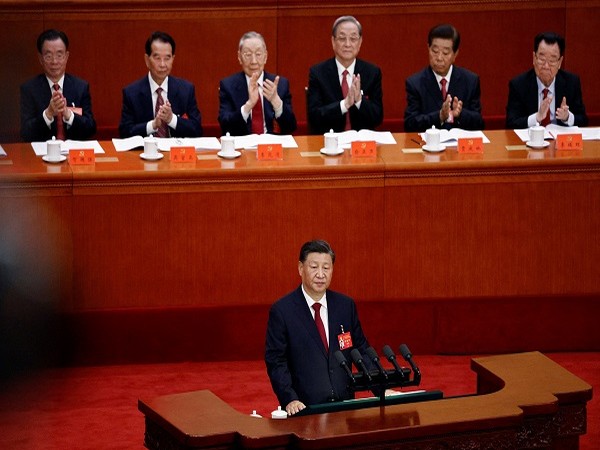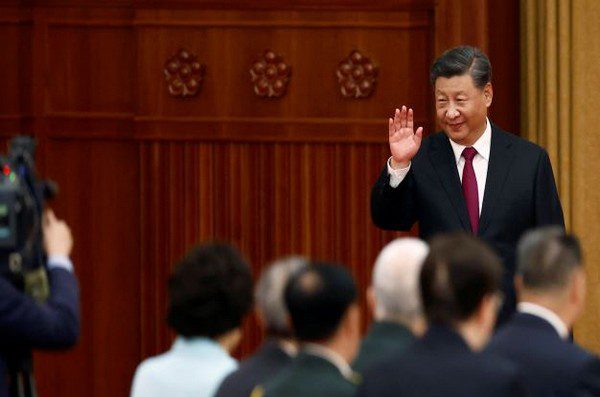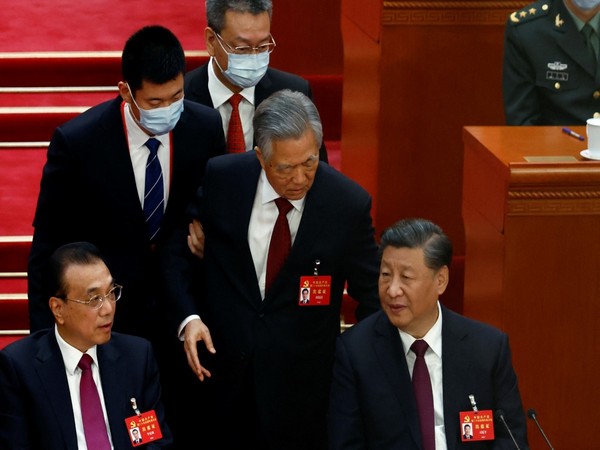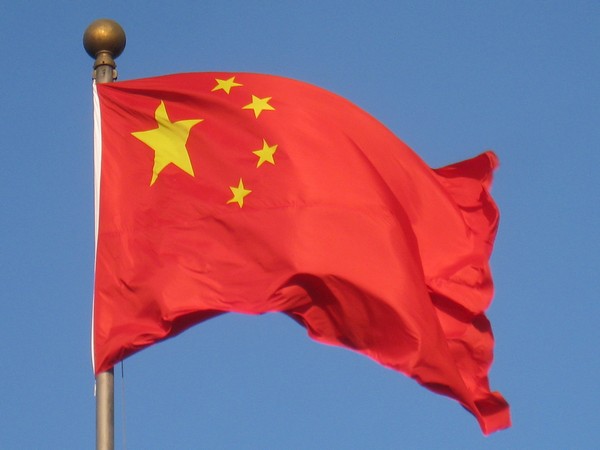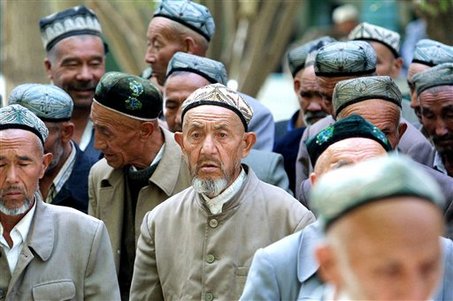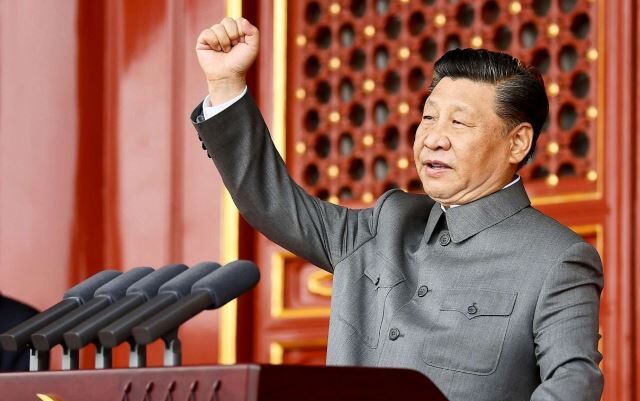The 20th National Congress from 16-22 October was the Chinese Communist Party’s (CCP) most important political event of 2022 and, if any were ever in doubt, it demonstrated that Chairman Xi Jinping is the nucleus of power in China and that none can dare stand against him.
There was absolutely no question that Xi would extend his time in office for another five years – and in fact, it will be far longer than that barring ill health – and that is precisely what happened at the congress. China has a one-man ruler, something that both its citizens and the rest of the world will have to learn to deal with.
The election of the 25-member Politburo and its seven-man Politburo Standing Committee (PSC), as well as the post of General Secretary, occurred during the 1st Plenary Session of the new Central Committee on 23 October. However, the most spectacular, mystifying, and alarming part of this follow-on session was the forcible removal of former president Hu Jintao from the Great Hall of the People from the seat at Xi’s left hand.
The official explanation? Xinhua tweeted that one of its reporters had “learned” 79-year-old Hu “insisted on attending the closing session…despite the fact that he has been taking time to recuperate recently. When he was not feeling well during the session, his staff, for his health, accompanied him to a room next to the meeting. Now, he is much better.”
What is a relief! But only if the gullible reader believes everything that China’s propaganda organ publishes. One can recall how Xinhua, ten years ago, stated that Chongqing vice-mayor Wang Lijun was enjoying “vacation-style medical treatment” when in actuality he was incarcerated in prison.
To believe that this was an instance of Hu suddenly feeling well does not accord well with the video footage of the incident. He appeared to ask Xi and Li Keqiang a question, both of whom nodded. Xi then prevented Hu from taking some nearby papers, but what followed next was unprecedented.
Kong Shaoxun, deputy director of the General Office of the CPC Central Committee since about April (and who works for Ding Xuexiang, who was spectacularly raised to the PSC), then urged Hu to leave the meeting. The latter was clearly reluctant to do so. Kong then attempted to physically pull Hu from his seat by lifting him under the armpits.
Li Zhanshu, who was sitting on the other side of Hu, half rose out of his seat to assist Hu, but he was tugged back down by Wang Huning, as if to say, “Don’t. Let this play out.” Li shortly afterward surreptitiously mopped the sweat from his brow. This was the political theater of the highest order. During and after, other CCP luminaries stared straight ahead as though nothing was happening, already cowed into fearful silence.
The fact that footage of Hu being led away like a lamb to the slaughter was not edited out or censored is evidence that this was probably deliberate. Media had been allowed into the hall just a short time before, and where everything is carefully choreographed and controlled, this was live drama like no other in recent decades of CCP history.
Indeed, it might have reminded some of Saddam Hussein’s rise to power in 1979, when 50 names were called out one by one in a Ba’athist Party meeting and each was accused of conspiracy. Those remaining vociferously swore allegiance to Hussein and were ordered to execute their former colleagues.
Could Xi have intended a similar chilling demonstration for the CCP? No executions, of course, as Xi is more cultured than the brutal Hussein, but through this moment, present and past leaders have been intimidated. It is relevant that Hu’s removal occurred just before a vote was held. Did Xi suspect that Hu might abstain or even dare to vote against him? Afterward, the voting was unanimously in favor of Xi.
So, either this was a premeditated move by Xi to humiliate Hu and demonstrate his unbridled power, or it was a major slip-up. The latter seems unlikely given the attention to detail in choreographing the five-yearly centerpiece of the CCP calendar. What will become of Hu now? If he undergoes party discipline, then it is unlikely to be publicized for some time.
Hu Jintao has largely been offstage under Xi’s reign. Many of his supporters have been purged, including his own chief aide Ling Jihua in 2015. His Communist Youth League faction has largely been eliminated, and he has no real influence in the CCP. This move could therefore be largely symbolic, and perhaps an indication of a cruel streak in Xi. The leader could have demoted him in private, but it seems he instead chose a theatrical put-down that doubled as a clarion warning to others.
Yet, interestingly, the CCTV evening news report on the congress closing ceremony showed Hu. If he were really purged, would CCTV have shown him like this? Then again, Hu’s name was censored on the Chinese internet after this. This mixed messaging reminds analysts that the nature of the moment is not fully understood yet.
Nonetheless, Ian Easton of the Project 2049 Institute in the USA commented, “If Hu Jintao can be frog-marched into the shadows like this, no one else in that room or anywhere else in China is safe from Xi Jinping’s personal dictatorship. Americans and our friends would be wise to accelerate disentanglement with China before the inevitable disaster occurs.”
Yang Zhang, Assistant Professor at the American University’s School of International Service, further commented: “What we just saw was the making of an ‘All Xi’s Men’ team, the breaking of decade-long rules and the birth of an unlimited supreme leader. These are not entirely surprising, but Xi’s grab of power is still beyond our expectations. He is now a truly modern emperor.”
Yang continued: “Xi will rule China for not one, but at least two and likely three terms (15 years). He is ‘only’ 69 years old: Mao ruled China until his death at 83, and Deng Xiaoping kept the Central Military Commission chair until 1989 when he was 85. So don’t expect Xi to retire before 2037. Xi’s power apex just started, today.”
Yang added that Xi is too young to anoint a successor. “His ministers have no interest in suggesting one. Potential candidates dare not imply it. Xi’s future successor is now a nobody (who is not even in the Central Committee this time). Succession may not be an issue in 2027. The rule of age limits is gone, completely. All 67 [years old], Li Keqiang, Wang Yang, and Chen Quanguo retired, while Wang Huning stayed in the PSC.
Moreover, Wang Yi (69) and Zhang Youxia (72) will be in the Politburo. Xi simply showcased his unlimited power by breaking the age limit rule.” Yang also pointed out Li Qiang, the Shanghai Party Secretary, who was appointed premier: “Premiership as we know it is gone … This is unprecedented because of Li’s lack of vice premiership or any central experience. Once Xi’s chief of staff, Li will be his chief grand secretary as premier.”
Xi has personally overseen the rise of Li, governor of Zhejiang (2012) and party secretaries of Jiangsu (2016) and Shanghai (2017). He has not accumulated any experience in the vice premiership or any central working experience.
Li Qiang’s rise to premier showcases how loyalty rather than popularity is the key to promotion under Xi. Li was immensely unpopular after Shanghai’s disastrous lockdowns, but he was rewarded with the number two spot in the CCP hierarchy because he implicitly followed Xi’s orders.
Yang thinks that this means Li will have to rely upon Xi’s authority to run the State Council. In other words, “Li will be a perfect technocrat for the emperor.” There is no power balance at the top, and it is shocking that a provincial official is catapulted straight into such a powerful position.
Apart from Li Qiang, if Ding Xuexiang becomes executive vice premier, then they will both be Xi’s technocrats, secretaries, and servants in the State Council. The whole nature of the State Council will be altered, with Yang saying, “It will no longer be parallel with the party, but simply one of many institutions under the leadership of the party and Xi.”
Yang predicted: “Old factions are all gone, while new factions are in the making. Factional identities are flexible and dynamic … After the full victory of Xi’s men, however, they will soon divide and contend for power.”
The seven-member Politburo Standing Committee illustrates how Xi has installed his acolytes into the highest seats. Headed by Xi, the PSC is fully stacked with allies, including four newcomers. It includes (in order of precedence): Li Qiang (63-year-old premier-to-be), Zhao Leji (65-year-old incumbent), Wang Huning (67-year-old incumbent), Cai Qi (66-year-old Beijing Party Secretary), Ding Xuexiang (Xi’s 60-year-old top political aide) and 66-year-old Li Xi (Guangdong Party Secretary).
What do they have in common? They are all Han males in their 60s and Xi loyalists. A surprise PSC omission was Vice-Premier Hu Chunhua, a former protege of Hu Jintao. This shows that Xi can now dispense with any pretense of having to balance different factions. The six PSC members are ideologically and temperamentally aligned with Xi, and there is no space for reformists and liberals in this top body.
This 20th National Congress can only be described as a sweeping victory for Xi and his cronies. Reshuffling of personnel is no longer bound by any precedents or CCP rules; all have been groomed and elevated based on a meritocracy of loyalty.
For instance, Cai Qi has risen unusually rapidly through the ranks. He took just nine months to move from Beijing Mayor to Beijing Party Secretary, and this unsympathetic character helped oversee cruel demolitions in the capital. Meanwhile, Li Xi will likely lead the Central Commission for Discipline Inspection.
As the dust settles, it would be very difficult to imagine a PSC dominated by Xi. As for the complete 25-member Politburo, 17 of its 25 members are newcomers. For the first time in 25 years, there is not a single woman in the Politburo, leading some to conclude that the CCP is increasingly Ethno-nationalist, misogynist, and autocratic. Even Zhang Gaoli, the ex-official at the center of allegations of sexual abuse from tennis star Peng Shuai, brazenly appeared at the top table of congress.
Deng Xiaoping said in 1980, “It is not good to have an over-concentration of power. It hinders the practice of socialist democracy and of the party’s democratic centralism, impedes the progress of socialist construction, and prevents us from taking full advantage of collective wisdom.”
Xi has grabbed control of all sectors of China’s policymaking process by either chairing them personally or by promoting loyalists into key positions. Ironically, at the same time that Xi torpedoed retirement age norms, the explanation for Hu Jintao – ill health and weakness – explains why age limits are such a good thing!
Xi desires, and perhaps even masterminded, the relentless and shameless rise of his own personality cult. As one Chinese textbook boasted, “The greatest achievement of the Cultural Revolution is producing a great leader like Xi. That alone made it worth all the trouble.”
Such assertions represent a slap in the face for the millions who died under Mao Zedong’s despotic reign. Xi, individually the most powerful man in the world, will make all the decisions in China. There will be no checks and balances on his power, especially as the collective and rotational succession model has been torn to shreds.
The world will have to rely on him not miscalculating. If things do go awry, Xi is not protected by any firewall, since he is surrounded by loyalists of his own choosing. This is obviously a risk he is willing to take. Firmly entrenched as China’s paramount leader, Xi is bound to continue his tough stance, perhaps even a supercharged one, on foreign and security policies.
It would seem inevitable that his aggression towards others will rise. Yet, with other countries less tolerant of China’s bullying, friction must increase. After seizing his third term, one important aspect is how much pressure will Xi put Taiwan under. It is unthinkable he will relax coercion of the island nation with which he is obsessed. He might well view his extension of power as a mandate to tighten the screws further.
After all, who else in China, or Taiwan, can oppose him? A downward spiral of action and counteraction already exists between China and the USA, with no exit ramp obvious. That day when Xi feels the People’s Liberation Army is ready to achieve victory via an invasion of Taiwan, or if he needs to bolster his political or historical position as China’s greatest leader, may well have suddenly gotten closer than anyone envisaged. (ANI)
Read More:http://13.232.95.176/
